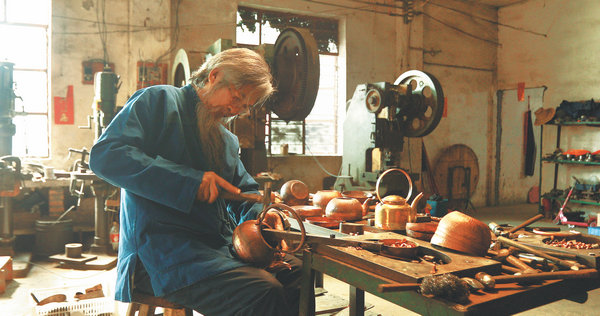 |
|
An elderly craftsman shows off his skill of traditional copper making in the documentary Cultural Inheritor. [Photo by Liu Xiangrui/China Daily] |
Fu Yongshou, a teacher of ethnomusicology at Yunnan Arts University, decided to document the singing traditions of the people of his native Hani ethnic group from Yunnan province, when he learned about a project initiated by the Ministry of Culture in 2015 to encourage such works.
His documentary, Historical Memories of the Elders, explores the rituals and processes involved in performing one of their epic songs, which recounts tales from the Hani people's collective history in the form of an extended vocal work.
His film made its debut at a recent photo and video exhibition about intangible cultural heritage held in Pingyao, a UNESCO world heritage town in Shanxi province, after being completed late last year by the Kunming-based filmmaker.
Running from June 7 to 9, the exhibition was jointly organized by the Center for Ethnic and Folk Literature and Art Development under the Ministry of Culture and the National Library of China, while also receiving assistance from several academic institutions from around China.
Organized on the theme of "Memory, Life and Propagation", the exhibition screened some 30 selected documentary films, all focusing on China's intangible cultural heritage and their inheritors like the ones portrayed in Fu's film.
According to its organizers, the aim of the exhibition was to raise the profile of intangible cultural heritage and inform the wider public about its value through screening and discussing films and documentaries relating to cultural heritage.
"Film and photography are becoming increasingly important mediums for recording our cultural history nowadays. These memories belong as much to the nation as they do to the individual, so by supporting these kinds of works, we hope to pass on more memories of our cultural history to future generations," says Li Song, chairman of the organizing committee.
Fu successfully applied to the heritage documenting support fund organized by the Ministry of Culture, and spent several months working on the film.
He spent an extra 200,000 yuan ($31,000) in addition to the 100,000 yuan subsidy offered by the project to finally complete the documentary.
"I didn't pay much attention to the financial side. The cultural benefits of the film are much more important than any economic aspect," explains Fu during the exhibition.
Fu says his aim was to document the disappearing culture of the Hani people. With the development of modern society, the epic songs-a highly ritualized part of traditional life where the Hani people recount key stories from their collective history through the form of long musical tales-are rarely seen, even in the heart of the ethnic group's settlements.
Fu undertook a long search through a number of villages before he finally found two village elders who could perform the epic songs from start to finish, a task so complex it can only be done through mutual cooperation.
During the interviews conducted in the documentary, the singers-who are both in their 70s-explained their understanding of the epic songs, while also voicing concern for the future.
"Few young people can perform the songs. Even those Hani people in their 30s and 40s have difficulty understanding every line," Fu explains.